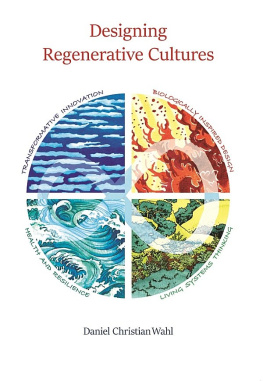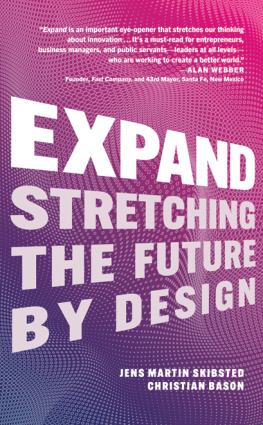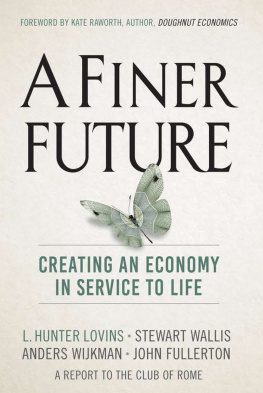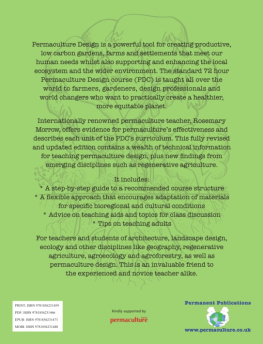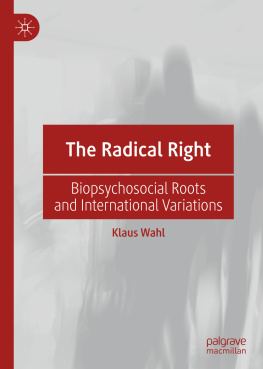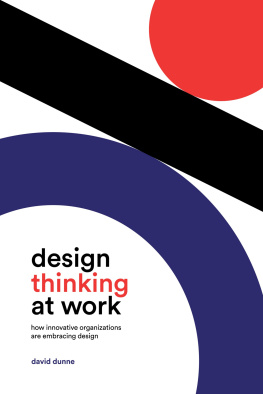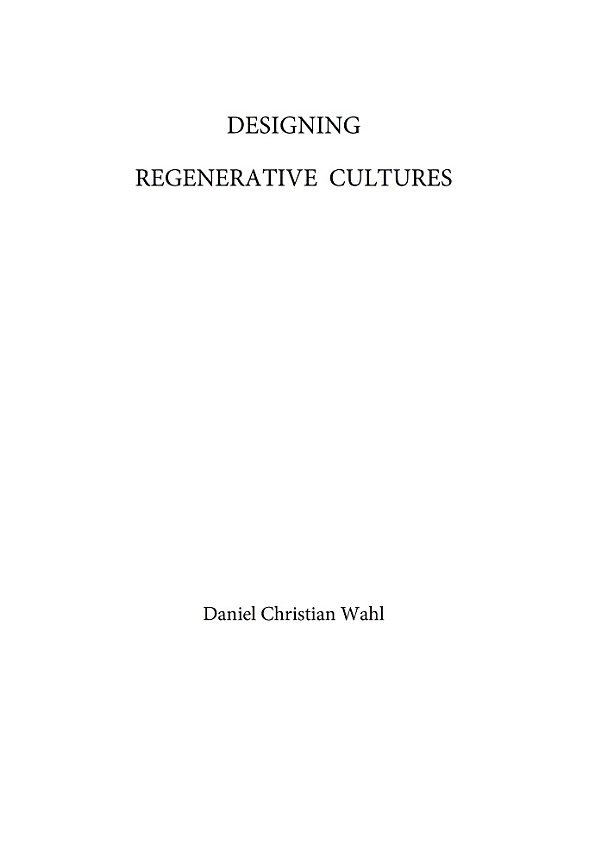
Published by Triarchy Press
Axminster, England
info@triarchypress.net
www.triarchypress.net
with International Futures Forum
Aberdour, Scotland
www.internationalfuturesforum.com
Copyright 2016 Daniel Christian Wahl (some rights reserved)
The right of Daniel Christian Wahl to be identified as the author of this book has been asserted by him under the Copyright, Designs and Patents Act 1988.
This work is licensed under a Creative Commons Attribution Non Commercial No Derivs 4.0 International License. For more information, please visit: https://creativecommons.org/licenses/by-nc-nd/4.0/

A catalogue record for this book is available from the British Library.
paperback ISBN: 978-1-909470-77-4
ePub ISBN: 978-1-909470-78-1
pdf ISBN: 978-1-909470-79-8
Cover illustration and custom illustrations: Flavia Gargiulo Rosa www.flaviagargiulo.com
E ARLY REVIEWS OF THE BOOK
Life on the planet has sustained itself for billions of years by continually regenerating itself. Our modern industrial culture has interfered with these natural processes to the point of causing massive extinctions of species and threatening our very survival. This book is a valuable contribution to the important discussion of the worldview and value system we need to redesign our businesses, economies, and technologies in fact, our entire culture so as to make them regenerative rather than destructive.
Fritjof Capra , author of The Web of Life , coauthor of The Systems View of Life
To me as a life-long activist nourished on systems thinking and Buddhist teachings, this is one of the most intellectually exciting and soul stirring books Ive read in years. I had the sense of drinking it, with pleasure and surprise, not having known what Id so thirsted for.
By starting with questions and keeping to questions throughout, Daniel engages the reader, and by example frees her from striving for, or pretending to know, any final answers. This approach in itself a rare lesson in systems epistemology invites trust, openness, and a restructuring of the mind.
Among the gifts for which I am especially grateful are these: Conceptual tools for perceiving and experiencing our mutual belonging, and especially what Ive come to call the great reciprocity at the heart of the universe. The ways Goethe, Bortoft, Bateson, Maturana, and Varela are brought in, and key insights mediated with economy and clarity. The abundant evidence of the Great Turning, the manifold transition underway to a life-sustaining culture. And, especially valuable to those of an apocalyptic bent like myself, the adaptive cycle of resilient systems, showing that at the edge of chaos comes opportunity for the emergence of greater complexity and intelligence. These are but a few of the ways in which this remarkable book will enrich my thought, my teaching, and my life in this turbulent world of ours.
Joanna Macy , environmental activist, scholar of Buddhism, general systems theory, and deep ecology and author of World as Lover, World as Self and numerous other books.
This book is a treasure for everyone who is looking for a guide to more sustainable living and a roadmap for re-designing our societies, regenerating our communities, cities and societies in harmony with natural systems and our home planet.
Daniel Wahl has deep experience to share and his knowledge in this beautiful book will help all those aspiring to be responsible global citizens working for our common future.
Hazel Henderson , author and President, Ethical Markets Media, Certified B. Corporation, USA & Brazil
This is an excellent addition to the literature on ecological design and it will certainly form a keystone in the foundations of the new MA in Ecological Design Thinking at Schumacher College. It not only contains a wealth of ideas on what Dr Wahl has termed Designing Regenerative Cultures but what is probably more important, it provides some stimulating new ways of looking at persistent problems in our contemporary culture and hence opens up new ways of thinking and acting in the future. Each chapter begins with an important question like, Why Nurture Resilience and Whole Systems Health or Why Take a Design-Based Approach and what follows in each case are suggestions to encourage deeper thinking. This is a very stimulating approach to learning. I am looking forward to using Dr Wahls book in challenging conversations with colleagues and students.
Seaton Baxter , Professor in Ecological Design Thinking, Schumacher College, UK
Worldviews change when existing solutions no longer work and rising problems require new approaches. Designing Regenerative Cultures is a lighthouse charting multiple pathways to the restless, impatient, continuing inquiry of our times, and [] gathering, including and transcending scattered parts of the undivided whole. Time may position Designing Regenerative Cultures as Daniels meisterstck and as a must read to all those who are aspiring to be at the forefront of the regenerative (r)evolution.
May East, Chief International Officer, Gaia Education
Living in a text-message culture, Designing Regenerative Cultures is another kind of text message, an essential textbook for our times, filled with resources, references, practices, methods and pathways, and best of all questions we can each live into, alone and together. Our world has benefitted from the contributions of many authors and visionaries, grassroots activists and social entrepreneurs, modern scientists and wise indigenous elders [] And yet, the single-hero journey of brilliant ones can only carry us so far. There is a deep need and longing for a local and global community of care on all levels in all disciplines. Daniel Wahl takes us there in this comprehensive manifesto, offering a wholistic picture of a way and a world we can be for, in lieu of the one that seems so headed for destruction [] Daniel weaves an old/new story helping and I suspect activating, readers to see, respect, learn from and go beyond, as he so clearly has, the great hearts and minds he references throughout. The book contributes to this awakening field as we find ourselves looking through a kaleidoscope of perspectives and teachings - different lenses moving in a spiral together through which to both view and live in our world. It can serve as a foundation for another great turn, a directory for next steps worth taking. Many will find inspiration and support to live the way we know we must, to live in the way we know we can if our species is not only to survive, but actually thrive in partnership with all of life.
Virginia (Gigi) Coyle , co-author of The Way of Council and The Box: Remembering the Gift; co-creator of the Ojai Foundation, the School of Lost Borders and Beyond Boundaries.
Daniel Wahl has compiled a great deal of useful information in a masterful synthesis. That alone is a significant accomplishment, but hes given us more than that. Designing Regenerative Cultures describes the doorway to a possible, indeed, necessary future. We are not fated to the dystopia in prospect. We have, as he writes, the capacity to design and to organize our societies to protect, enhance, and celebrate life. The blueprint was there all along. The awareness of our possibilities is growing. The art and sciences of ecological design are flourishing. The choice, as always, is ours and that of those who will follow.
David Orr (environmentalist and Paul Sears Professor of Environmental Studies and Politics at Oberlin College and a James Marsh Professor at the University of Vermont).
Next page
